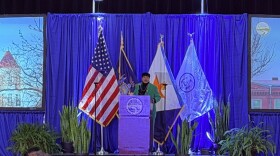Homeowners who sustained damage from this year's flooding along Lake Ontario have until 5 p.m. Friday to apply for financial aid from the state. New York leaders appropriated millions of dollars this year to help residents recover from historically high water levels, but there may not be enough to go around.
Gary Beasley is CEO of the nonprofit Neighbors of Watertown, which is administering the flood grant program for Oswego, Jefferson and St. Lawrence counties. He says their staff has been working around the clock to handle what turned out to be an overwhelming amount of applications.
"We kind of expected the applications to come in fairly heavy at the beginning in May, June and July and at that time we had estimated to the state that we would have 400 applications, perhaps 500 at the outside," Beasley said. "We’re looking at doubling those numbers and it really was a surprise."
Beasley says more than 900 applications have been submitted, claiming anything from structural damages to houses, septic systems and wells and shoreline erosion. And the Neighbors of Watertown have paid out or committed to pay more than $1 million thus far. But that only covers about 45 cases. And Beasley says with Oswego, Jefferson and St. Lawrence counties' $5 million share of state aid, only about a quarter of those who apply can be paid.
"If you look at the sheer numbers, it looks like a lot of people will have trouble getting assistance," Beasley said.
Still, Beasley says state legislators are aware of the demand and may appropriate more funding.








